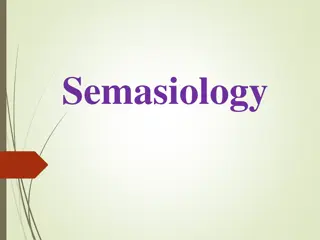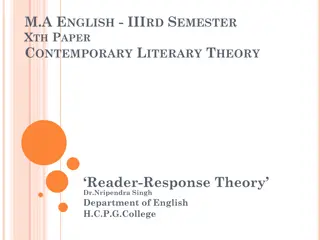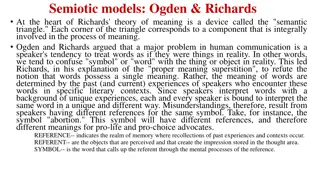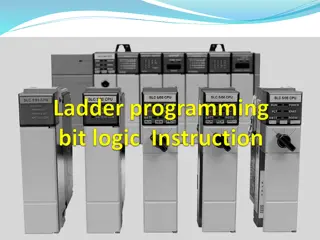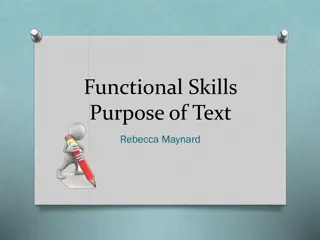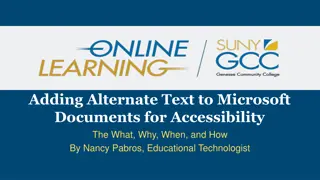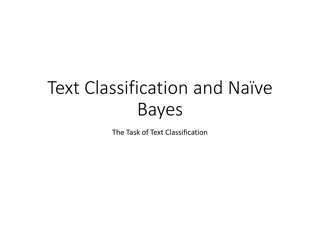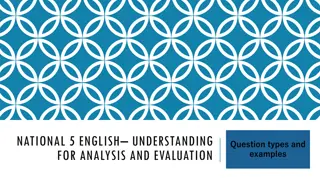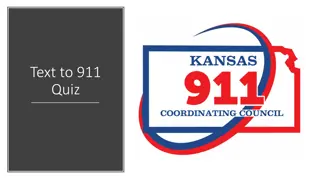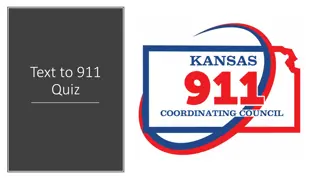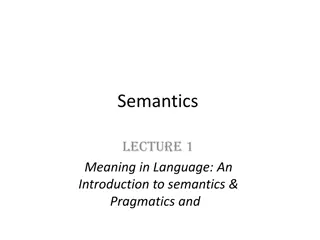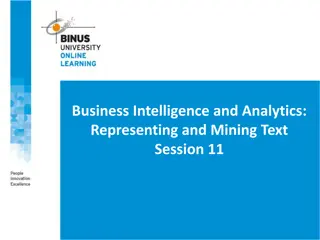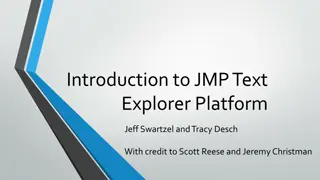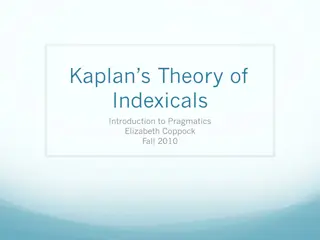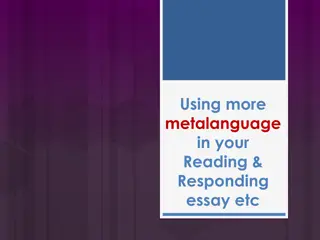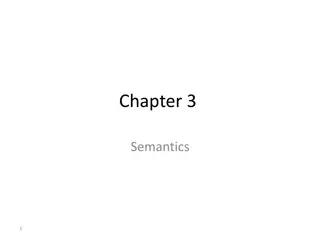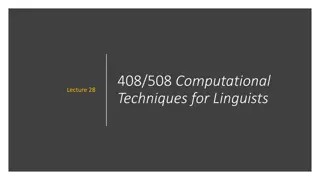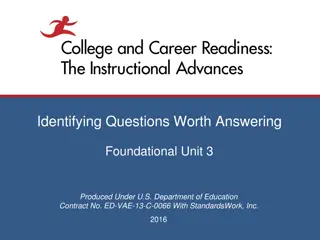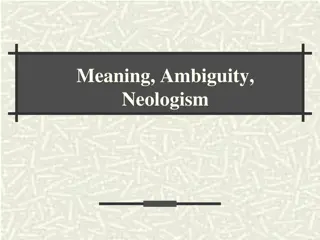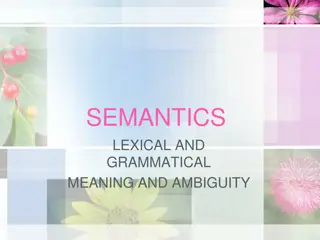CS 404/504 Special Topics
Adversarial machine learning techniques in text and audio data involve generating manipulated samples to mislead models. Text attacks often involve word replacements or additions to alter the meaning while maintaining human readability. Various strategies are used to create adversarial text examples
1 views • 57 slides
Understanding Semasiology: The Study of Word Meaning
Semasiology is a branch of linguistics focused on the meaning of words. It delves into various aspects of lexical meaning, semantic development, polysemy, and semantic structure. Through exploring types of word meanings and semantic changes, semasiology helps us comprehend the intricate nuances of l
4 views • 19 slides
Understanding Translation: Key Concepts and Definitions
Translation involves transferring written text from one language to another, while interpreting deals with oral communication. Etymologically, the term "translation" comes from Latin meaning "to carry over." It is a process of replacing an original text with another in a different language. Translat
11 views • 76 slides
Understanding Semasiology: The Study of Meaning in Language
Semasiology, a branch of lexicology, focuses on the study of meaning in language through different approaches such as the referent approach and functional approach. The referent approach links the sound form with the concept denoted by the word, while the functional approach emphasizes the relations
2 views • 15 slides
Evolution of Mathematical Theories and Proof Systems
Development of mathematical theories such as model theory, proof theory, set theory, recursion theory, and computational complexity is discussed, starting from historical perspectives with Dedekind and Peano to Godel's theorems, recursion theory's golden age in the 1930s, and advancements in proof t
1 views • 29 slides
Psychological Theories of Criminality: Understanding the Roots
Psychological theories of criminality delve into the association between intelligence, personality, learning, and criminal behavior. Major theories include Psychodynamic Theory by Freud, Behavioral Theory by Bandura, and Cognitive Theory by Kohlberg. These theories explore how unconscious mental pro
1 views • 20 slides
Understanding the Theory of Firms: Neoclassical vs. Modern Approaches
The theory of firms is explored through the Neoclassical and Modern perspectives. Neoclassical theory focuses on profit maximization, while Modern theory delves into managerial, principal-agent, and transaction cost theories. The discussion covers criticisms of Neoclassical theory and the essential
1 views • 79 slides
Understanding Reader-Response Theory in Literary Criticism
Reader-response criticism in literary theory emphasizes the reader's role in interpreting and creating meaning from a literary work. This theory contrasts with approaches focusing solely on the author or text, highlighting the active engagement of readers in shaping the significance of a piece of li
1 views • 7 slides
Theories of Causation in Psychological and Social Sciences
Overview of theories of causation categorized into psychological, social psychological, and sociological perspectives. Psychological theories focus on instinctive, biological, and psychological qualities of abusers, including Attachment Theory, Psychodynamic Theory, Social Learning Theory, and Situa
0 views • 15 slides
Understanding Political Theory through a Contextual Approach
Exploring G.H. Sabine's perspective on political theory through a contextual approach, emphasizing the importance of historical context and societal influences. Sabine argues that while political theory evolves with its contemporary politics, it should be analyzed within its specific time and social
0 views • 9 slides
Semiotic Models: Theory of Meaning by Ogden & Richards
Ogden & Richards proposed the theory of meaning through the "semantic triangle," emphasizing the role of past experiences in interpreting words. They highlighted the importance of distinguishing symbols from the actual referents to avoid misunderstandings. Additionally, Richards discussed the effect
0 views • 14 slides
Introduction to Structured Text in PLC Programming
Structured text is a high-level text language used in PLC programming to implement complex procedures not easily expressed with graphical languages. It involves logical operations, ladder diagrams, and efficient control logic for industrial automation. Concepts such as sensor input, logic operation
5 views • 23 slides
Evolution of Light Theory: From Wave Theory to Quantum Theory
At the turn of the century, the discovery of the photoelectric effect challenged the wave theory of light, leading to the development of the quantum theory by Max Planck and Albert Einstein. This new theory introduced the concept of discrete energy units known as quanta, bridging the gap between wav
1 views • 62 slides
Understanding Functional Skills: Text Analysis and Application
This instructional text guides learners through the purpose of functional skills in analyzing different types of text, such as skimming and scanning, and understanding the features of various text genres. It includes activities to practice skimming, scanning, and detailed reading, with a focus on de
0 views • 13 slides
Enhancing Accessibility Through Alternate Text in Microsoft Documents
Explore the importance of alternate text in Microsoft documents for accessibility. Learn what alternate text is, why and when you should use it, and how to add it effectively. Discover the benefits of incorporating alternate text and the legal aspects related to accessibility under Section 508. Enha
0 views • 23 slides
Dp-branes, NS5-branes, U-duality, and M-Theory Overview
Overview of Dp-branes, NS5-branes, and U-duality derived from nonabelian (2,0) theory with Lie 3-algebra. Introduction to M-theory, including M2-branes and M5-branes in the strong coupling limit. Discussion on BLG theory, Lorentzian Lie 3-algebra, and the ABJM theory for M2-branes.
1 views • 32 slides
Text Classification and Nave Bayes: The Power of Categorizing Documents
Text classification, also known as text categorization, involves assigning predefined categories to free-text documents. It plays a crucial role in organizing and extracting insights from vast amounts of unstructured data present in enterprise environments. With the exponential growth of unstructure
0 views • 28 slides
Understanding Audience and Purpose in Text Analysis
When analyzing written texts, identifying the purpose and audience is crucial. The purpose reflects the reason behind the text, while the audience indicates who the text is intended for. By recognizing these aspects, one can better understand the content, language, and overall impact of the text. Va
1 views • 50 slides
Essential Information on Text-to-911 System
Explore key details about the text-to-911 system, including capturing text conversations, handling abandoned calls, transferring text calls to queues, and managing text conversations effectively. Learn about system configurations, call release timings, and dispatcher capabilities in handling text me
0 views • 12 slides
Text-to-911 System Operations Quiz
Test your knowledge on Text-to-911 system operations with this quiz. Learn about capturing text conversations, handling abandoned calls, transferring calls to queues, text conversation timelines, and more. Enhance your understanding of the protocols and procedures involved in managing text-based eme
1 views • 12 slides
Meaning and Meaning-making in Big Q Qualitative Research
Qualitative research explores different understandings of meaning and meaning-making, providing researchers with tools, techniques, and values. Big Q qualitative research focuses on the active role of words in creating meaning beyond reflecting experiences. This lecture series delves into the founda
1 views • 20 slides
Understanding Time-Independent Perturbation Theory in Quantum Mechanics
Perturbation theory is a powerful tool in solving complex physical and mathematical problems approximately by adjusting solutions from a related problem with known solutions. This theory allows for more accurate approximate solutions by treating the difference as a small perturbation. An example inv
0 views • 19 slides
Ethical Theories: Divine Command vs. Virtue Theory Explained
Divine Command Theory asserts that morality is derived from God's commands, contrasting with Virtue Theory which focuses on developing moral virtues to achieve human flourishing and excellence. Divine Command Theory relies on religious texts, while Virtue Theory emphasizes the cultivation of virtues
0 views • 24 slides
Understanding Fermi Liquid Theory in Interacting Fermion Systems
Fermi liquid theory, also known as Landau-Fermi liquid theory, is a theoretical model that describes the normal state of metals at low temperatures. Introduced by Landau and further developed by Abrikosov and Khalatnikov, this theory explains the similarities and differences between interacting ferm
0 views • 23 slides
Introduction to Meaning in Language: Semantics & Pragmatics
Meaning in language is explored in this introductory lecture, covering aspects such as communication, semiotics, linguistic channels, and approaches to studying meaning. The process of encoding messages, signal transmission, noise interference, and decoding are discussed within the context of commun
0 views • 19 slides
Understanding Text Representation and Mining in Business Intelligence and Analytics
Text representation and mining play a crucial role in Business Intelligence and Analytics. Dealing with text data, understanding why text is difficult, and the importance of text preprocessing are key aspects covered in this session. Learn about the goals of text representation, the concept of Bag o
0 views • 27 slides
Computational Learning Theory: An Overview
Computational Learning Theory explores inductive learning algorithms that generate hypotheses from training sets, emphasizing the uncertainty of generalization. The theory introduces probabilities to measure correctness and certainty, addressing challenges in learning hidden concepts. Through exampl
0 views • 43 slides
Introduction to JMP Text Explorer Platform: Unveiling Text Exploration Tools
Discover the power of JMP tools for text exploration with examples of data curation steps, quantifying text comments, and modeling ratings data. Learn about data requirements, overall processing steps, key definitions, and the bag of words approach in text analysis using Amazon gourmet food review d
0 views • 23 slides
Automata Theory and Theory of Computation Overview
This course overview covers concepts in automata theory and theory of computation, including formal language classes, grammars, recognizers, theorems in automata theory, decidability, and intractability of computational problems. The Chomsky hierarchy, interplay between computing components, modern-
0 views • 42 slides
Understanding Kaplan's Theory of Indexicals
Kaplan's Theory of Indexicals explores the concept of indexicality in language, defining indexicals as words whose referents depend on the context of use. The theory distinguishes pure indexicals from demonstratives and emphasizes the directly referential nature of indexicals. By delving into altern
0 views • 30 slides
Theories of Interest in Microeconomics II
Explore various theories of interest in economics, including the Classical Theory, Liquidity Preference Theory by Keynes, Productivity Theory, Abstinence Theory, Time-Preference Theory, Fisher's Time Preference Theory, and the Loanable Fund Theory. These theories offer different perspectives on the
0 views • 6 slides
Analyzing Texts: Constructing Meaning with Metalanguage
Explore the construction of meaning in a text through the author's use of metalanguage, examining social, historical, and cultural values embedded within the text. Understand how textual evidence supports analysis and interpretation, recognizing the text's openness to diverse interpretations. Discov
0 views • 20 slides
Exploring the Evolution of Atomic Theory
Delve into the historical journey of atomic theory starting from Democritus and Aristotle's views to modern advancements proving some aspects of Dalton's theory incorrect. Learn about key laws and theories such as the Particle Theory of Matter, Dalton's Atomic Theory, and JJ Thomson's discoveries, s
0 views • 30 slides
Understanding Natural Language Generation (NLG) Process
Natural Language Generation (NLG) is the process of constructing natural language outputs from non-linguistic inputs. It involves generating text from machine representations to meet specific communicative goals. NLG is distinct from Natural Language Understanding (NLU) as it maps meaning to text, w
0 views • 38 slides
Understanding Semantics: Exploring Types and Dimensions of Meaning
Explore the complexities of semantics by delving into the types and dimensions of meaning. From descriptive to non-descriptive meaning, learn how the normality profile of linguistic items contributes to their overall meaning. Distinguish between semantic and grammatical anomalies and discover the nu
0 views • 32 slides
Understanding Bigrams and Generating Random Text with NLTK
Today's lecture in the Computational Techniques for Linguists course covered the concept of bigrams using NLTK. Bigrams are pairs of words found in text, which are essential for tasks like random text generation. The lecture demonstrated how to work with bigrams, including examples from the NLTK boo
0 views • 19 slides
Enhancing Reading Comprehension Through Text-Dependent Questions
This resource delves into the significance of text-dependent questions in improving students' reading comprehension skills by emphasizing the importance of evidence from the text, building knowledge through nonfiction, and developing critical thinking abilities. It highlights key advances in educati
0 views • 16 slides
Exploration of Literary Theory: Death of the Author in "Hag-Seed" and "Team Gonzalo
Explore the concept of the death of the author in literature through the works "Hag-Seed" and "Team Gonzalo." Delve into Roland Barthes' theory, which separates the author from the text, emphasizing the role of the reader in interpreting meaning within the narrative. Witness how this theory is demon
0 views • 7 slides
Understanding Ambiguity in Translation Theory
Exploring the complexities of ambiguity in translation theory, this content delves into the nuances of meaning, neologisms, and the challenges faced by translators in deciphering text. It discusses the various types of ambiguity, such as lexical and semantic, highlighting their impact on language in
0 views • 27 slides
Understanding Semantics, Lexical, and Grammatical Meaning
Exploring the nuances of semantics, lexical meaning, and grammatical meaning, this content delves into the distinctions between them, the role of lexemes, and the complexities associated with words. It discusses the various kinds of meanings expressed at the lexical and grammatical levels, including
1 views • 37 slides



